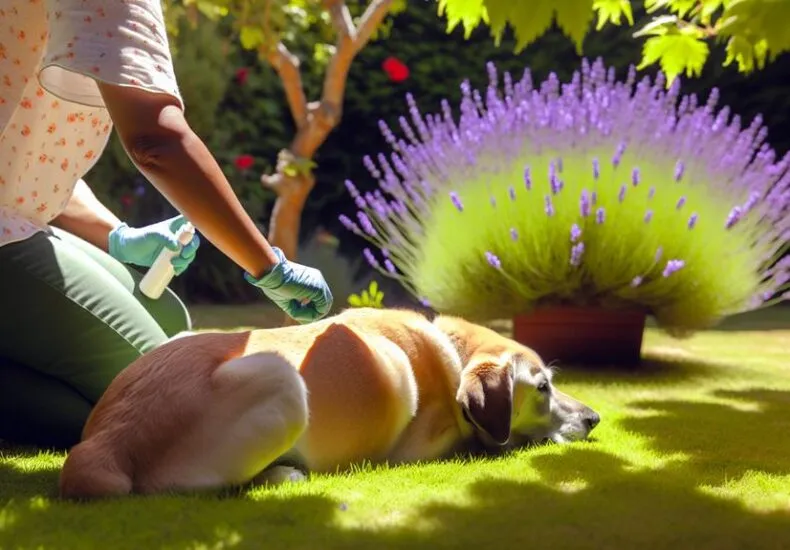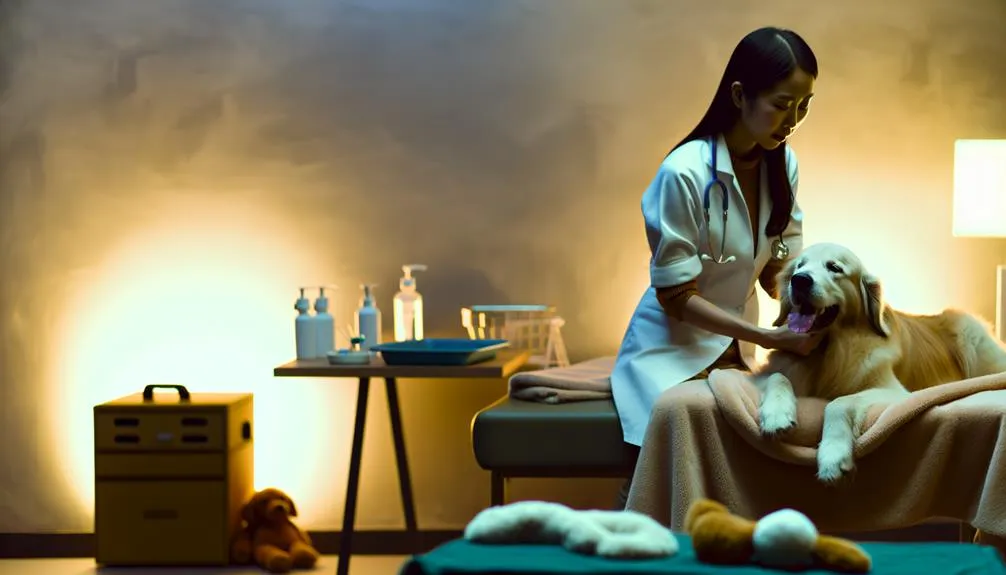
How to Soothe Dog Irritated Anus
If you've noticed your dog exhibiting discomfort around their rear, you're likely looking for ways to soothe their irritated anus. It's important to start with proper hygiene, as this can greatly impact their comfort. You might also consider specific creams and dietary adjustments to promote healing. However, understanding the underlying cause is vital, and neglecting this could lead to more serious issues. As you explore these options, you'll find that addressing the problem holistically can yield better results for your furry friend. What's the first step you should take?
Identify the Underlying Cause
When you notice your dog frequently licking or scooting its backside, it's crucial to identify the underlying cause of the irritation. This behavior often points to discomfort, which can stem from various sources. Common irritants like fleas, food allergies, or infections can lead to inflammation around the anal area. If your dog has recently been scratching or biting at its skin, it may indicate a flea infestation that warrants immediate attention.
Another potential cause could be dietary issues. Some dogs may develop sensitivities to certain ingredients in their food, leading to digestive upset and subsequent irritation. Keep an eye on your dog's diet and consider any recent changes that might correlate with the licking behavior.
Behavioral factors can also play a role in your dog's actions. Stress or anxiety may cause your dog to engage in excessive licking as a coping mechanism. Changes in the household, such as new pets or alterations in routine, can trigger this response. Observing your dog's overall behavior and environment can help you determine if anxiety is a contributing factor.
Maintain Proper Hygiene
Maintaining proper hygiene is imperative for preventing and soothing irritation around your dog's anus. Regular cleaning can help eliminate potential irritants and keep your dog comfortable. Start by incorporating effective cleaning techniques into your routine. You can use gentle, pet-safe wipes or damp cloths to clean the area. Be certain you're wiping in the direction away from the anus to avoid any further irritation. If your dog has long fur, consider trimming the hair around this sensitive area to reduce fecal buildup and make cleaning easier.
Grooming tips play an essential role in maintaining hygiene. Regularly groom your dog to catch any issues before they escalate. Brush your dog's coat frequently to minimize shedding and guarantee that dirt and debris don't accumulate. Pay extra attention to the rear end during grooming sessions, checking for any signs of irritation or infection. If you notice redness or swelling, it's crucial to consult your veterinarian.
Additionally, bathing your dog regularly can keep their entire body clean, which includes the anal area. Use a mild, hypoallergenic shampoo to avoid irritating their skin. After bathing, be certain to dry the area thoroughly, as moisture can lead to further irritation.
Use Soothing Creams

For dogs suffering from irritation around their anus, using soothing creams can provide much-needed relief. These creams often contain natural remedies that help to alleviate discomfort and promote healing. When choosing a soothing cream, look for products specifically formulated for dogs, ensuring they're free from harmful chemicals or fragrances that could exacerbate the irritation.
Once you've selected a suitable cream, proper application techniques are essential for effectiveness. Start by ensuring your dog's rear area is clean and dry. Gently clean the area with a soft cloth or pet-safe wipe to remove any irritants. After that, apply a small amount of the soothing cream directly to the irritated area. Use your fingers or a cotton swab to spread the cream evenly, ensuring full coverage without applying too much pressure, as that could cause further discomfort.
It's important to monitor your dog after application. Observe for any signs of improvement or worsening symptoms. If the irritation persists or seems to worsen, consult your veterinarian for further guidance. They may recommend additional Treatment options or check for underlying conditions that could be causing the irritation.
Incorporating soothing creams into your dog's care routine can be an effective way to manage anal irritation. Remember, your dog's comfort is paramount, and taking these steps can greatly enhance their quality of life.
Adjust Their Diet
Adjusting your dog's diet can play an essential role in soothing an irritated anus. Start by identifying any food allergens that may be causing discomfort, and consider increasing their fiber intake to promote healthier digestion. These dietary changes can greatly improve your dog's overall comfort and well-being.
Identify Food Allergens
Identifying food allergens is an essential step in addressing your dog's irritated anus, as certain ingredients can trigger uncomfortable reactions. If you suspect your dog has food sensitivities, it's crucial to examine their diet closely. One effective method to pinpoint these allergens is through an elimination diet. This involves removing potential allergens and gradually reintroducing them to observe any adverse reactions.
Here are some common food allergens for dogs to evaluate:
- Beef: Often a primary protein source, but can cause sensitivities.
- Chicken: Another common protein that may lead to reactions in some dogs.
- Dairy: Many dogs are lactose intolerant, leading to digestive issues.
- Grains: Wheat and corn can trigger allergies in sensitive pups.
Increase Fiber Intake
Increasing your dog's fiber intake can considerably help alleviate irritation around their anus. Fiber plays an essential role in digestion, promoting regular bowel movements and preventing issues like constipation or diarrhea, which can contribute to discomfort. When selecting fiber sources for your dog, consider options like pumpkin, sweet potatoes, or green beans. These foods are not only rich in fiber but also provide additional nutrients that support overall health.
Incorporating these fiber sources into your dog's diet can lead to significant digestion benefits. A well-balanced diet that includes adequate fiber can help firm up loose stools, reducing the likelihood of them irritating the anal area. If your pup's current diet is low in fiber, gradually introducing these foods can help their digestive system adjust without causing further upset.
Always consult your veterinarian before making major dietary changes, especially if your dog has existing health concerns. They can offer tailored advice on the right amount of fiber for your dog's size and needs. Remember, a simple adjustment in diet can go a long way in ensuring your furry friend feels comfortable and happy.
Provide Plenty of Water

Ensuring your dog stays hydrated is vital, especially if they're experiencing discomfort from an irritated anus. Proper water intake can greatly help alleviate their discomfort. When your dog is well-hydrated, it aids digestion, promotes overall health, and can even help in reducing inflammation. Here are some hydration benefits you can expect when your dog drinks enough water:
- Improved digestion: Adequate water helps in breaking down food and absorbing nutrients.
- Balanced body temperature: Staying cool is important, especially if your dog is feeling unwell.
- Healthy skin and coat: Hydration supports skin elasticity, helping to reduce irritation.
- Enhanced kidney function: Sufficient water intake helps flush out toxins from the body.
To encourage your dog to drink more, make sure fresh water is always available. You might also consider adding some ice cubes to their bowl for a rejuvenating treat or offering water in a pet-friendly dispenser. Additionally, incorporating wet dog food or adding water to their dry food can help increase their overall water intake.
If your dog shows signs of dehydration—like lethargy, dry gums, or decreased skin elasticity—it's important to consult your veterinarian. By focusing on providing plenty of water, you're taking a proactive step to help soothe your dog's irritation and promote their well-being. Remember, a comfortable dog is a happy dog!
Monitor for Parasites
Even with proper hydration, your dog might still experience discomfort if parasites are present. Parasites, such as worms or protozoa, can lead to irritation around the anus, causing your furry friend considerable distress. It's essential to monitor for signs of parasite infestation, as these can contribute to ongoing health issues.
Regular fecal examinations are an important part of parasite prevention. By having your dog's stool tested periodically, you can identify any unwanted guests in their system. This proactive approach not only helps to alleviate current discomfort but also prevents future infestations. If you notice symptoms like excessive licking, scooting, or visible worms in the feces, it's time to take action.
In addition to regular fecal examinations, maintaining a parasite prevention routine is critical. This may include medications recommended by your veterinarian, which can help keep those pesky parasites at bay. Make sure your dog is on a consistent preventative treatment plan, especially if they spend time outdoors or interact with other animals.
It's also important to keep an eye on your dog's environment. Cleaning up promptly after your pet and making certain they're not exposed to contaminated areas can greatly reduce the risk of parasite transmission. By being vigilant and proactive about your dog's health, you can help ease their discomfort and promote overall well-being. Monitoring for parasites is a key step in keeping your dog happy and healthy.
Consult Your Veterinarian

If you notice signs of irritation in your dog's anus, it's vital to consult your veterinarian as soon as possible. They can provide professional advice tailored to your pet's specific condition and explore potential Treatment options. Addressing the issue promptly can help relieve your dog's discomfort and guarantee their overall health.
Signs of Irritation
Recognizing the signs of an irritated anus in your dog is vital for their well-being. Early symptom recognition can prevent further discomfort and potential complications. It's important to observe for any behavioral changes that could indicate something's wrong. Here are some common signs to watch for:
- Frequent scratching or licking of the anal area
- Difficulty sitting or a reluctance to lie down
- Signs of discomfort, such as whining or pacing
- Unusual stool consistency or blood in the stool
If you notice any of these symptoms, it's essential to consult your veterinarian. While some signs may seem minor, they can indicate underlying issues that require professional attention. Your vet will help determine the cause of the irritation and suggest the appropriate treatment. Remember, your dog's comfort is paramount, and addressing these signs promptly can greatly improve their quality of life. Don't hesitate to reach out for help if you're concerned; proactive care is the best way to guarantee your furry friend stays healthy and happy.
Importance of Professional Advice
When you notice signs of irritation in your dog's anal area, seeking professional advice can make all the difference. Your veterinarian is trained to identify underlying causes that may not be obvious to you, such as infections, parasites, or allergies. Ignoring these symptoms could lead to more significant issues, so it's vital to act promptly.
A vet's assessment can help you understand the importance of preventative measures. They can recommend dietary changes or grooming practices that might minimize future irritations. It's also important to observe any behavioral signs your dog may exhibit, like excessive licking or discomfort when sitting. These behaviors can provide valuable insights into your dog's condition and guide your vet in making an accurate diagnosis.
Your veterinarian can also help you determine if your dog's irritation is part of a more serious health concern. Relying on their expertise guarantees that you're addressing the issue thoroughly, rather than just treating symptoms. Remember, your dog's health is a priority, and consulting a professional is a proactive step toward safeguarding their well-being. Don't hesitate; your furry friend deserves the best care possible.
Potential Treatment Options
Several Treatment options can effectively address your dog's irritated anus, but it's essential to consult your veterinarian before starting any regimen. Your vet can help identify the underlying cause and recommend the best course of action tailored to your dog's specific needs.
Here are some potential Treatment options you might consider:
- Topical treatments: Your vet may suggest soothing ointments or creams to alleviate discomfort and promote healing.
- Natural remedies: Some natural options, like coconut oil or aloe vera, can help soothe irritation and provide relief.
- Dietary adjustments: Switching to a high-fiber diet or adding probiotics can improve digestive health and minimize irritation.
- Regular grooming: Keeping the anal area clean and free from mats or debris can prevent further irritation.
Frequently Asked Questions
Can I Use Baby Wipes on My Dog's Irritated Anus?
You shouldn't use baby wipes on your dog's irritated anus, as they may contain chemicals harmful to pets. Instead, consider dog hygiene-specific wipes or gentle alternatives designed for sensitive skin to guarantee comfort and safety.
How Often Should I Check My Dog for Anal Gland Issues?
You should check your dog's anal gland hygiene during regular grooming sessions, ideally every few weeks. Keeping an eye on this helps prevent issues and guarantees your dog stays comfortable and healthy in the long run.
Are There Any Home Remedies for Soothing an Irritated Anus?
Imagine your dog's discomfort like a thorn in their paw. For soothing, consider natural treatments such as coconut oil or aloe vera, and dietary adjustments like adding fiber. These can promote healing and comfort for your furry friend.
What Signs Indicate My Dog Needs Immediate Veterinary Attention?
If you notice signs like excessive licking, bleeding, swelling, or difficulty sitting, your dog may need immediate veterinary attention. These common symptoms can indicate serious anal health issues that require prompt professional evaluation and care.
Can Stress Cause My Dog's Anal Irritation?
Yes, stress can trigger anal irritation in dogs. Behavioral signs like excessive licking, hiding, or changes in appetite may indicate discomfort. Monitoring your dog's stress levels is essential for their overall well-being and health.
Conclusion
Ultimately, soothing your dog's irritated anus involves a few thoughtful steps. Did you know that nearly 30% of dogs experience Anal gland issues at some point in their lives? By identifying the underlying cause, maintaining proper hygiene, and making dietary adjustments, you can greatly improve your pet's comfort. Always keep an eye out for any signs of parasites and don't hesitate to consult your veterinarian for persistent issues. Your furry friend deserves the best care possible!
You may also like
Archives
Calendar
| M | T | W | T | F | S | S |
|---|---|---|---|---|---|---|
| 1 | 2 | 3 | 4 | 5 | 6 | |
| 7 | 8 | 9 | 10 | 11 | 12 | 13 |
| 14 | 15 | 16 | 17 | 18 | 19 | 20 |
| 21 | 22 | 23 | 24 | 25 | 26 | 27 |
| 28 | 29 | 30 | ||||
Leave a Reply